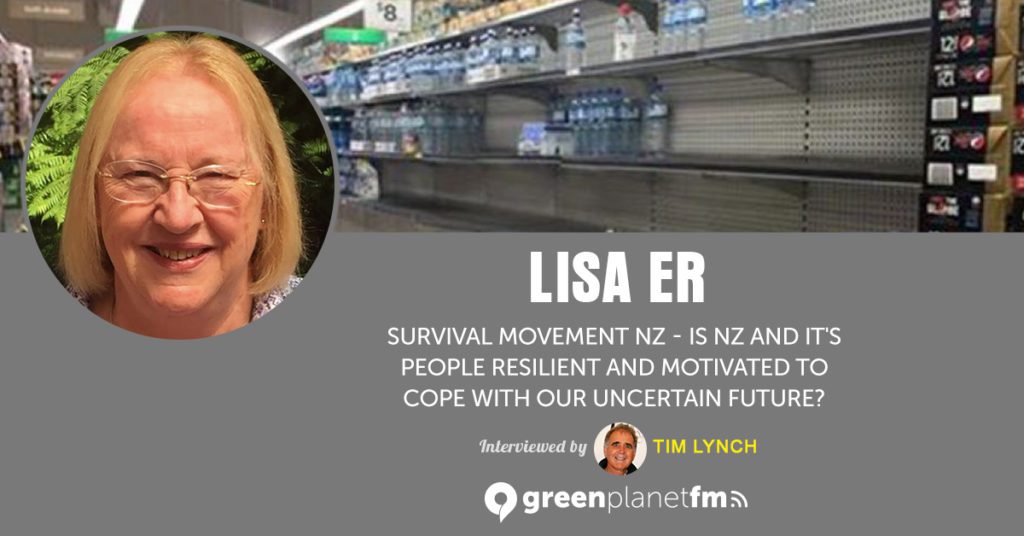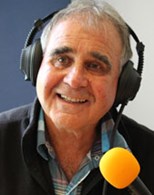
The world is in a dire state.
Climate change is lapping at our doors.
It is estimated that one fifth of the world’s population will become climate migrants, if they survive at all.
Global food security will be severely impacted. With food shortages, food prices spike.
There will be more floods, droughts, and forest fires.
Sea level rise will affect many places around the country and houses will become uninhabitable.
The world economy is unstable. At any time your local ATM could be shut and you could be unable to withdraw money. For how long you don’t know.
World trade could collapse as money markets fail.
If we don’t stop the widespread use of insecticides and herbicides the world will see an insect collapse in 100 years, which will cause the biosphere
to collapse.. However our food supply will basically be destroyed at only a 75% loss.
How will we survive the next few decades if no changes are made to our lifestyles?
Lisa is asking us to get real and look at our uncertain future, and then do something about it.
Last year Lisa had no power for 4 days after a large storm hit Auckland and so experienced living with no electricity for that time. So she had to buy
a BBQ, which she was able to drive and buy - so she was ok with cooking for those 4 days. She also had ready access to food and a generator to keep
the freezer working.
But, what if a crisis was for a longer period? That it was city wide, provincial, or national? Fortunately Auckland has a gravity fed water reticulation
system, from large storage facilities (with diesel generators as backup) - so water in most situations will get to everyone’s homes, as long as the
economy is functioning.
If food in supermarkets runs out?
It is no good saying that you will be ok because you are off the grid or growing all your own food.
If there’s a major crisis there is the possibility of armed and desperate people coming in and taking all your vegetables from your garden and food from
your house. We need to have in place staple food and essentials in localised storage facilities that is readily accessible for the supermarkets in
the city?
Lisa states that if NZ put in place a well thought out strategy and plan to deal what nature or the global financial system issues occur - then NZ is well
placed to weather it out. The proviso being - that the political process is involved.
So what does one do to make us resilient and more self reliant? We have to look at electricity, transport and food, especially food, and find efficient
ways to get these items to people everywhere in the city and regions in the case of a major emergency or long term crisis .
This has to be planned for at both Local Government level and at Governmental levels. Lisa said contact both Local and Central Government and ask them
what contingencies they have for this? Local Governments are easier to contact and have influence as well as contacts in Central Government.
In 2017 - 82% of NZ electrical needs were from renewables
In 2007 Helen Clark when PM set a national target of 90% renewables by 2025. With wind energy to make up most of this increase. Which is exceptionally
and good for our country. Making it exceptionally high by world standards.
Lisa mentioned if a category 5 storm hit Auckland we could be without power for several weeks as a huge number of lines would be down.
However she says the key to this is preparation and in Pittsburgh in Pennsylvania in the USA - they are factoring in their cities future to be more green
and aware.
http://pittsburghpa.gov/dcp/sustainability-resilience
Auckland Council’s website is a page where you can leave suggestions for consideration …. so she wants us all to support innovative ways to make
Auckland (and New Zealand) resilient. However, there are some things that have to be done through Central Government as well.
Lisa wants the Reserve Bank of NZ to create money, not private banking, as in the NZ Social Credit Party’s financial policy. As a small country we might
be able to get away with it, and not have the overseas bankers turn the screws on us. But, she said that if there was a crisis - all the major countries
would be crisis too. https://socialcredit.nz Supporting local banks and co-operatives is
also essential
So we need to be aware and prepare.
Tim - NZ has the capacity to extract both oil and gas. We need to have enough to keep every truck and bus running on NZ roads and Lisa mentioned back in
the 1970's, with the oil problems, that we in NZ had carless days.
We have 3 months of stored fuel in the country as an emergency measure, but Lisa mentions no food is currently stored. Most NZ wheat is now is grown in
Australia and processed there too. As Dr Janice Priest mentioned a few weeks ago in a GreenplanetFM interview Australian wheat is a strain that is
heavy in gluten, whereas NZ’s previous wheat had far less gluten.
All of our rice is grown overseas - and Lisa says it's a big Achilles heel, that needs to be seriously addressed. Many other staples have to be imported
rather than being grown here.
She mentions a TV series in Britain many years ago where a virus caused mass deaths and what few survivors there were had to scavenge and eventually fight
for food and she says hungry people will fight till the death - that it was a very dark story - so why not prepare for the future especially as climate
change may have unparalleled effects.
Tim mentions 'Transition Towns' is operating in a number of places in NZ.
http://www.transitiontowns.org.nz - Originally it was set up in response arising from climate
change, resource depletion and an economy based on growth.
Lisa says they at one level are fantastic but asks if they have solutions for a crisis in a large city.
Tim mentions that in the meantime farmers markets are a way forward and you can network from there and build relationships and have also sales of items
other than food.
https://www.ourplanet.org/greenplanetfm/jeff-griggs-transition-towns-mens-sheds-localised-food
Community Gardens across the Nation?
We hear that the Manukau Health Board are involved with 75 community gardens in their area and there are a further 25 community gardens happening in the
Auckland City area. This too is a good start to enable community to come together and meet and cooperate and collaborate. There are many different
ethnic groups as wells cultures involved, being a great melting pot.
Tim mentions Living Economies - a NZ web site that can help anyone anywhere develop a system for your local community - especially setting up a Time Bank
as well as Financial Pools and creating Green dollars and they have all the connections for you - just go up to LivingEconomies.nz and you can download computer programs to set up a Time Bank for example. Learn about Local money (also known
as local currencies or complementary currencies) which is an approach to trading using voluntary vouchers (like “green dollars”) or tokens (print or
electronic) instead of legal tender (such as New Zealand Dollars).
Project Lyttelton have over 700 people with their time bank for example.
We also learn that Project Lyttelton was very prepared for the devastating Earthquake that struck Christchurch in 2011 and they were pivotal in saving
lives, because they had a telephone tree and so many people knew each other and being experienced in cooperation that the Civil Defence HQ recommend
that all communities follow the way Project Lyttelton has gone about pulling the strings of community together.
Project Lyttelton received letters of thank you from the NZ Police, St Johns Ambulance, the Fire Brigade, the NZ Navy and especially Civil Defence, due
to the fact they were able to mobilise rapidly and work tirelessly for the benefit of the community.
Neighbourly - Lisa says this is important for us to either be aware of and or join.
https://www.neighbourly.co.nz/?gclid=EAIaIQobChMI8ZaZwPXP4QIVSyQrCh1j7wMjEAAYASAAEgKJ_fD_BwE
Get Through - is a New Zealand Government sponsored website giving pointers to prepare ourselves for emergencies and other contingencies with at least
3 days of water, 3 days with of food and other preparations, like First Aid kits, batteries for radios, etc . This is good preparation for storms or
earthquakes.
It would be good to have a New Zealander of sufficient mana to champion the need for a secure long term future to both Local and Central Government. Please
assist us in finding this champion.
Lisa also mentions what other future challenges there are.
Insect collapse - If we carry on the same agricultural and chemical practices scientists state that 100 years out we will be in a dire situation, so we
need to stop using pesticides and herbicides. The drop in numbers of bees and Monarch butterflies is showing us we are taking down our future.
Note that there are no insects on your car windscreen or moths at night or when you do not draw the curtains or close the blinds. Why?
Get off insecticides Neonicotinoids is the number one culprit for the decline of bees.
Go organic but first transition via Biological and Regenerative agriculture.
Do a search in GreenplanetFM.com
Now that France has finally banned glyphosate and now Monsanto products. Can NZ follow?
Lisa mentions Auckland Council contractors are using glyphosate which is very problematic, but so are home owners and farmers. Glyphosate / Roundup is
a disaster. It is contaminating our food and killing grasses and weeds where insect lavae live and birds feed, and is now found in our bodies owing
to its prevalent use.
The state of Sikkim gets a jump on NZ agriculture. Why can’t NZ follow?
Lisa also mentions possible economic collapse. Some people are keen to go self sufficient but how do old people and retirement villages survive such challenges.
Not everyone is young enough or fit enough to grow their own food. What are the contingency plans for those who can’t do their own gardening, and if
there is flood, fire or drought, growing our own food wouldn’t be much help anyway.
Tim mentions that all the parks and golf courses in cities can be dug up and put into gardens - realising that the golf course greens would be very chemically
toxic. But, this could be doable in a prolonged emergency.
There were many other interesting subjects mentioned in this interview.
Lisa talks about strong visionary leadership that can direct what needs to be done to manage the future. She says we must prepare now and not wait until
it is too late. She says a government Think Tank, or similar, is needed to study where this country is insecure.
New Zealand must be self sufficient in food, go local, and be prepared to cope not only with our own climate migrants, but with those from overseas.
Climate change will transform more than 143 million
people into “climate migrants” escaping crop failure, water scarcity, and sea-level rise, a new World Bank report concludes. See here -https://news.nationalgeographic.com/2018/03/climate-migrants-report-world-bank-spd/
On facebook - Survival Movement NZ - Lisa invites people to participate.
https://www.facebook.com/groups/470181836848018/
